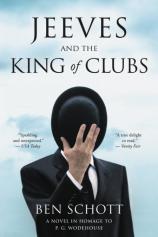Jeeves and the King of Clubs: A Novel in Homage to P.G. Wodehouse
Review
Jeeves and the King of Clubs: A Novel in Homage to P.G. Wodehouse
Bertie Wooster and his valet, Jeeves, are woven into the imagination of anyone who has lived in --- or loved --- England. Created by P.G. Wodehouse a century ago, the two characters inhabited dozens of books, several television series and a few films. In an interview, Ben Schott, the bestselling author of the Schott’s Miscellany series, says that writing this homage was “the most fun I’ve ever had.” That is evident throughout this confection of a novel.
Authorized by the P.G. Wodehouse estate, JEEVES AND THE KING OF CLUBS takes place right before World War II, and there are faint echoes of impending troubles, though Schott is careful to keep the allusions vague. As the novel begins, Bertie is visiting his aunt and uncle’s country house, where he is recruited by Jeeves and members of the Junior Ganymede Club --- originally established so that butlers and valets could compare notes on their betters --- to help the British government find fascist spies. One likely suspect, Lord Sidcup, bears an uncanny resemblance to a certain present-day president. With an improbable hairdo and the slogan “Keep Great Britain Great,” he extols “The British love of Britishness.” It’s as if, suggests one observer, “he has a vocabulary of thirty words and just throws them together indiscriminately.”
"What makes JEEVES AND THE KING OF CLUBS feel fresh is that, aside from sly nods to contemporary issues, the characters are in their respective stations, but not entirely of those stations..."
There are many zany subplots, including Bertie’s efforts to help his Aunt Dahlia launch a competitor to Lea & Perrins’ iconic sauce, his pursuit of the charming Scotswoman, Iona MacAuslan, and his attempts to get various members in and out of his private club, sometimes literally. Jeeves is ever the strategic thinker, provoking Bertie to ruminate that “I’ve often wondered whether Jeeves is wasting himself at my side when he could be answering a calling more suited to his talents --- like ruling benevolently over Imperial Rome.”
Schott has fun manipulating language throughout the book. Members of his club have reciprocal privileges with other establishments “so that the denizens of clubdom can always drink port in a storm.” On overhearing a private phone conversation late one evening, Bertie refers to it as the “curious incident of the dialogue in the nighttime.” At the end of the novel, the reader is treated to “Notes on the Text,” where such terms as Boil-washed coins and Bruichladdich are faithfully explicated, using real historical and literary facts.
What makes JEEVES AND THE KING OF CLUBS feel fresh is that, aside from sly nods to contemporary issues, the characters are in their respective stations, but not entirely of those stations --- Jeeves is a valet but also given his due as The Master, as Bertie refers to him; Uncle Tom and Aunt Dahlia have a large estate, but are constantly looking for creative ways to pay for it; and Bertie’s friend, Montague Montgomery (Monty), is happy to work three jobs to pay his rent. That they all succeed is one of the true delights of this gentle yet very funny book.
Reviewed by Lorraine W. Shanley on November 16, 2018




